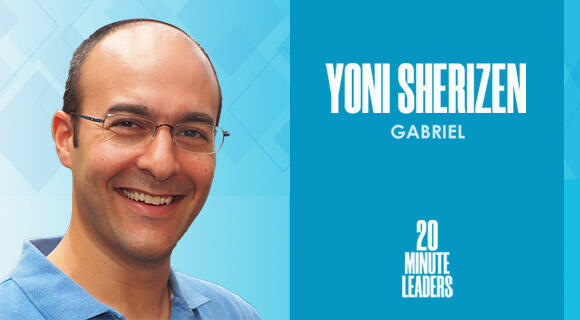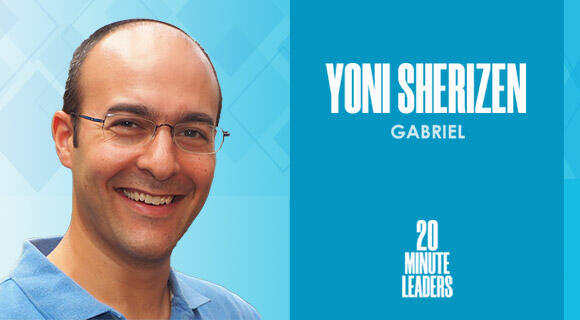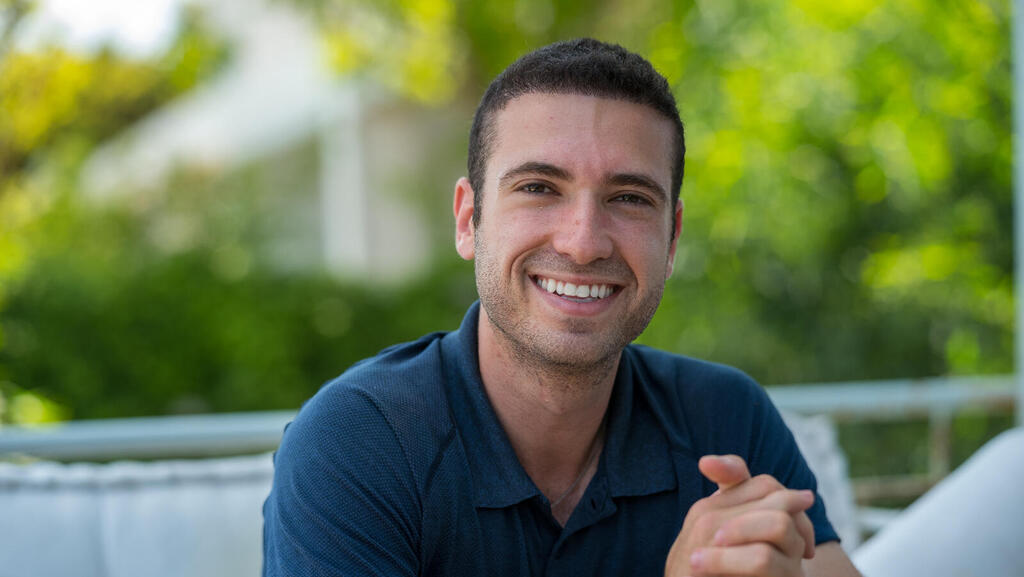
20-Minute Leaders
“Chaos actually becomes the greatest threat in a crisis situation.”
Yoni Sherizen shares that wanting to detect threats quickly and empower the people nearby led him to co-founding Gabriel, where he is CEO
After witnessing a terror attack in Tel Aviv and seeing the aftermath of a mass shooting in the US, Yoni Sherizen realized there was a huge need for better responses in crisis situations. The chaos that often unfolds in these scenarios can become the biggest threat, he explains. Sherizen shares that wanting to detect threats quickly and empower the people nearby led him to co-founding Gabriel, where he is CEO. Gabriel is a software platform that automates the processes that need to happen quickly during an emergency while providing greater visibility and communication for first responders. The tools give customers the equivalent of a security command center in their device while helping law enforcement come in more prepared to respond to the incident safely, he says. After spending 15 years in nonprofits, Sherizen wanted to create a business that delivered value and did good for the world as well.
Tell me how you end up working in this crisis response domain with Gabriel.
I spent many years outside of the world of security or technology. I decided to take a small break from business in order to do work in the nonprofit space and education. That journey ended up being almost 15 years. When I did make that transition back into business, I decided to take some of that purpose in the nonprofit world. By delivering good, we'll be able to drive success from a business point of view, as well as bring impact into the world.
Around that time, I witnessed the impact of a terror attack in Tel Aviv and saw how these things unfold from relatively close range. Then a few days later, it was the Pulse nightclub shooting down in Orlando, Florida. I saw a lot of similarities in those two situations. When you start scratching beneath the surface, you see a real need.
When we have an event happening, like an active shooter in a school, how do you deal with that today?
Today, we are still dealing with it in the way that we did many years ago. That's why we see the need and an opportunity here. If you were to walk into a building where you saw something suspicious and you felt, "I have got to tell people about this," what do you do? Do you pick up the phone and call 911? Do you shout to people inside? There are so many different things that you have to do and you can only choose one.
That's where Gabriel, which we developed, steps in and automates all of those processes that have to happen. You need to identify that threat as early as possible. Once you have identified that threat, you then need to do all these things in tandem, such as alert people inside the building so that they can get to a safe place. You need to alert on-site management and security. And help that’s outside the building, how do you get them engaged? How do you give them eyes and ears inside so they turn up much smarter and it's actually safer for everyone involved?
Tell me about the product and how Gabriel works.
We recruited some of the best and the brightest from the worlds of security, intelligence, special forces, and SWAT teams. What we found is there are some very core principles that you have to have. When they are not there, chaos actually becomes the greatest threat in a situation like this. Those two things that you have to have are visibility and communication. What we are trying to do is democratize those tools and get them out into the hands of people in vulnerable spaces as quickly as possible.
When you have that instant visibility and communication, you can understand what's going on where and move people to where they need to get to. We started by saying, "We have got to detect trouble sooner and empower people in that environment." We put help within reach of every hand. Everything from a panic button to leveraging all the smartphones to transform them into life saving devices in real time.
We want to also hook into all existing infrastructure in the system. Cameras, PA systems, etc, so that you can instantly create a clear picture of what's going on, layer that onto the floor plan. Through Gabriel, we are automatically feeding law enforcement that information and the ability to communicate inside the scene even before they've arrived.
There was an event that this played a pretty interesting role in, right?
That's right. When we built Gabriel, we hoped that we would never be faced with a real-life scenario. I used to say, "We hope to never face a situation, but we hope to do drill after drill and educate a new generation." Unfortunately, in April, the unthinkable happened on a campus that is using our platform. All of a sudden, in the middle of a very complex campus, with a lot of very vulnerable people, gunshots ring out.
Thankfully, Gabriel was there to immediately alert and isolate that situation and put it to an end. Unfortunately, one person did lose their life. But we are proud to be able to say that we helped to very quickly apprehend the individual, isolate the threat, keep everyone away.
Gabriel is the software that's behind the aid to the enforcement that shows up. You personally were involved with that situation. How did you experience that in real time?
One of the key tools that we built and value for our customers is that they really have a security operations center in their palm. They can have a distributed security team that really jumps in and helps manage a situation. As a founder and someone who cares deeply about this, I insist that I'm part of every environment on the platform.
I was home in Israel wrestling my daughter to sleep. My phone goes off. It's a siren followed by “lockdown emergency.” We actually have our own hardware sensors that we put into the environment, and it tells me which device, which campus, and it gives me instant video and audio from that sensor. I open it up and I see people scrambling. It could still be a false alarm. I hit the ten second rewind, and I see and I hear gunshots. At that point, I moved into a room and I really became part of the first response team from halfway around the world.
In the coming school year, how many children will die in school shootings? How many employees will die in the workplace? The answer should be zero. The answer should be, "We are prepared. We are trained." A hundred years ago, we were panicking in fires and dying from smoke inhalation and tramplings. But we have been able to train, to put in the right systems, and educate a generation. I don't believe a child will die from a fire in a school next year. But the fact that we put up with people dying in the workplace and in schools means there is something fundamentally wrong.
How do we scale this? How do you get to be in every school and every office?
This is such a sensitive subject and regulation has not yet required a solution like this in every building. I believe it's on its way. The way that every space has a fire alarm, one day will require the blue cousin to the fire alarm. What we learned is that, because it's such a sensitive subject, going in with partners who already have the trust of the customer is often very helpful.
You don't want to just sell through any channel partner. You need to find those that really align with your values, your core mission. It's true for staff, advisory board members, investors, and channel partners: turning down the ones who do not have the right ethos is one of the most important lessons that we have learned.
How is Gabriel's story related to Yoni's story?
We all want to be impactful. When I was making this transition back over to the business world, I heard a great lecture about what motivates employees: mastery, autonomy, and purpose. We want to be good at what we do. We want to have the space to achieve it. And we want to know that we are doing something meaningful. In my personal journey, it was about keeping that impact yet also doing great business. We are running a business, but we are going to run a business that treats people well, that delivers value and makes the world a better place.
Michael Matias, Forbes 30 Under 30, is a Venture Fellow at Innovation Endeavors as well as investment Venture Partner at Secret Chord and J-Ventures. He studies Artificial Intelligence and Human-Computer Interaction at Stanford University, and was an engineer at Hippo Insurance. Matias previously served as an officer in the 8200 unit. 20MinuteLeaders is a tech entrepreneurship interview series featuring one-on-one interviews with fascinating founders, innovators and thought leaders sharing their journeys and experiences.
Contributing editors: Michael Matias, Megan Ryan














